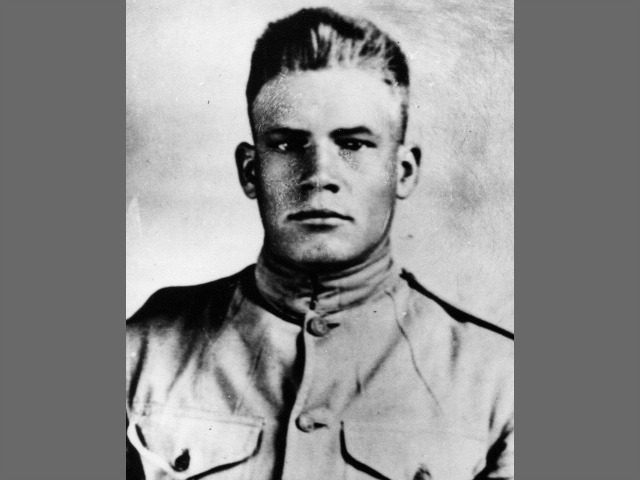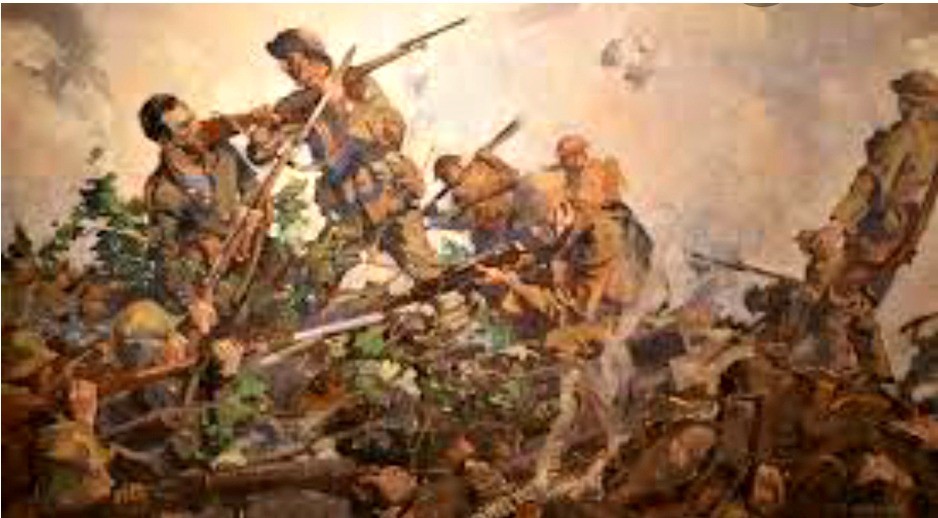This week marks the 101st anniversary of the U.S. Marine Corps’ bloodiest day and one of its most important battles of WW I: Blanc Mont. Several Marines earned Medals of Honor on the blood-soaked ridge, including Corporal John Henry Pruitt.
Pruitt served under Major General John A. Lejeune, the commander of the 2nd Division and 4th Marine Brigade. Several days before the battle, Lejeune stared at the large relief map sprawled out in front of him. His eyes focused on the ridgeline where the Germans had constructed an ostensibly impregnable fortress—Blanc Mont. Hundreds of machine-gun nests, an intricate maze of trenches, concrete blockhouses, artillery pieces, and tangled masses of barbed wire awaited any force foolish enough to attack. For years, the French Army had launched one forlorn assault after another on the fortress resulting in a bloodbath—thousands of men killed, gored attempting to scale the sloping limestone rock.
The tough commander, “a Marine’s Marine” later hailed as “one of the greatest of all leathernecks,” was one of only two Marine officers to hold a divisional Army command. The 2nd was one of the finest divisions in the Allied armies. Marshal Foch, noting the 2nd’s élan and battlefield prowess at Battles of Belleau Wood and Soissons, had requested the division be placed under the temporary command of the Fourth French Army, which was led by the grizzled, one-armed General Henri Gouraud.
Gouraud explained to Lejeune that the French Army had stalled in front of the high ground and his men were exhausted. He had earmarked the 2nd for the formidable task of breaking through the powerful German defenses. Gouraud’s piercing eyes and bushy handlebar mustache seemed almost to pop off his face as he emotionally placed his only hand on the German fortress atop Blanc Mont Ridge on the map. “General,” he declared, “this position is the key of all the German defenses of this sector, including the whole Rheims Massif. If this ridge can be taken, the Germans will be obliged to retreat along the whole front thirty kilometers to the river Aisne. Do you think your division could effect its capture?” Without hesitation, Lejeune informed Gouraud that the 2nd could seize the stronghold.
The 2nd Division and John Pruitt were about to enter one of the most perilous kill zones on the Western Front. The various Army and Marine units within the 2nd Division would converge on Mont Blanc like two giant arrowheads. If they survived the onslaught, the men would link up on the crest.
The Battle of Blanc Mont is captured in my national bestselling book, recently released in paperback The Unknowns: The Untold Story of America’s Unknown Soldier and WWI’s Most Decorated Heroes Who Brought Him Home.
Twenty-one-years-old and hailing from Phoenix, Arizona, Corporal Pruitt and his 78th Company of the 2nd Battalion 6th Marines charged into the heart of combat. One of Pruitt’s fellow Marines described the moment when wave after wave of Marines and soldiers from the two brigades went over the top at 5:50 a.m. on October 3, charging into the teeth of German defenses:
“For a moment, the sun shone through the murk, near the horizon—a smoldering red sun, banded like Saturn, and all the bayonets gleamed like blood. Then the cloud closed again.” In front of them lay the result of the previous doomed French attack on the German trenches. Scores of dead soldiers formed “a wedge, thinning toward the point as they had been decimated, and at that point was a great bearded Frenchman, his body all a mass of bloody rags, who lay with his eyes fiercely open to the enemy and his outthrust bayonet almost in the emplacement.”
By the evening of October 4, Marines and soldiers had fought their way up on the crest of Blanc Mont and continued to hack, blast, and shoot the Germans fiercely defending concrete bunkers and trenches on the ridge. Far from headquarters, the men fighting atop Blanc Mont had now gone twenty-four hours without food or water. In desperation, the men scavenged the dead for their canteens while the Germans mercilessly counterattacked, shelled, and gassed them.
Within this cauldron of battle, Pruitt’s actions were extraordinary: “Pruitt single-handedly attacked two machine guns, capturing them and killing the enemy. He then captured 40 prisoners in a dugout nearby.” No stranger to bravery, Pruitt had accomplished a similar feat only weeks earlier during the Saint-Mihiel offensive, seizing an enemy machine gun nest in the small French town of Thiaucourt.
Shortly after capturing the dugout and German prisoners, Pruitt sniped at enemy soldiers with his Springfield rifle, but German shellfire mortally wounded the gallant Marine.
Digging in on the northern side of Blanc Mont, the Marines girded for their coming attack at dawn. John Henry Pruitt would never see dawn. He would die on October 4 of the wounds sustained from his epic charge. For his valor on October 3, 1918, however, Pruitt’s family posthumously received an Army Medal of Honor as well as a Navy Medal of Honor. Nineteen other Americans received two medals—a practice discontinued after WWI. Like many of the men of WWI, aptly named the forgotten generation, the soldiers on Blanc Mont might not be celebrated, but like the sons that would follow them, they were also a great generation.
Patrick K. O’Donnell is a bestselling, critically acclaimed military historian and an expert on elite units. He is the author of 12 books including The Unknowns: The Untold Story of American’s Unknown Soldier and WWI’s Most Decorated Heroes Who Brought Him Home which is currently featured at Barnes & Noble and Washington’s Immortals which has been named one of the 100 Best American Revolution Books of All Time by the Journal of the American Revolution. O’Donnell served as a combat historian in a Marine rifle platoon during the Battle of Fallujah and speaks often on espionage, special operations, and counterinsurgency. He has provided historical consulting for DreamWorks’ award-winning miniseries Band of Brothers and for documentaries produced by the BBC, the History Channel, and Discovery. PatrickkODonnell.com @combathistorian


COMMENTS
Please let us know if you're having issues with commenting.